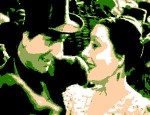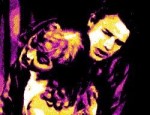Film Review

Right from the outset Joseph Losey had little regard for the script and was troubled by the apparent weaknesses in the somewhat contrived and fanciful story. However, he was determined to rise above these concerns (knowing that if he failed his filmmaking career would probably be over) and with the support of his distinguished cinematographer Harry Waxman and talented cast he succeeds in crafting a compelling noir-like drama. The experience of making this film was not altogether bad for Losey, since he had the opportunity to experiment with technique and form to a greater extent than he had been able to during his time in Hollywood. The result is a film that is stylistically impressive, marred only by a risible storyline and some weak characterisation.
Those familiar with Losey's work will recognise the characteristic stylistic and thematic touches which would form an integral component of the baroque style of his later films, such as the endless use of shadows and mirrors to suggest confinement and narcissistic self-delusion. Despite the mediocre script, the performances hold our attention and render the implausible story just about credible. In an early dramatic part, Dirk Bogarde performs with a brooding intensity that suggests psychotic menace and tortured vulnerability - streets away from the genial role in the Doctor films which had just made him a household name.
© James Travers 2009
The above content is owned by frenchfilms.org and must not be copied.
Film Synopsis
One evening, the eminent psychiatrist Dr Clive Esmond is held up by a young petty crook named Frank Clements. Esmond manages to disarm his assailant, but rather than hand him over to the police he decides to take him home and subject him to an intense course of therapy. The psychiatrist is confident that he can cure Clements of his criminal tendencies and transform him into a useful member of society. Esmond's wife Glenda is understandably perturbed when she learns that her husband has adopted a dangerous criminal but, over time, she begins to find the aggressive young man strangely attractive. Despite his benefactor's best efforts, Clements continues his criminal exploits, whilst embarking on a passionate love affair with his wife...© James Travers
The above content is owned by frenchfilms.org and must not be copied.
Similar Films
Here are some other films you may enjoy watching:- Dead Reckoning (1947)
- Knife in the Water (1962)
- Möbius (2013)
- The Strange Love of Martha Ivers (1946)
- Une autre vie (2014)
Other related links:
Film Credits
- Director: Joseph Losey
- Script: Maurice Moiseiwitsch (novel), Harold Buchman, Carl Foreman
- Cinematographer: Harry Waxman
- Music: Malcolm Arnold
- Cast: Dirk Bogarde (Frank Clemmons), Alexis Smith (Glenda Esmond), Alexander Knox (Dr. Clive Esmond), Hugh Griffith (The Inspector), Patricia McCarron (Sally Foster, maid), Maxine Audley (Carol), Glyn Houston (Bailey), Harry Towb (Harry, second criminal), Russell Waters (Manager of Pearce & Mann), Billie Whitelaw (Receptionist at Pearce & Mann), Fred Griffiths (Taxi Driver), Esma Cannon (Scrubwoman with ladder)
- Country: UK
- Language: English
- Support: Black and White
- Runtime: 89 min
The greatest French Films of all time

The best of American cinema

The history of French cinema
